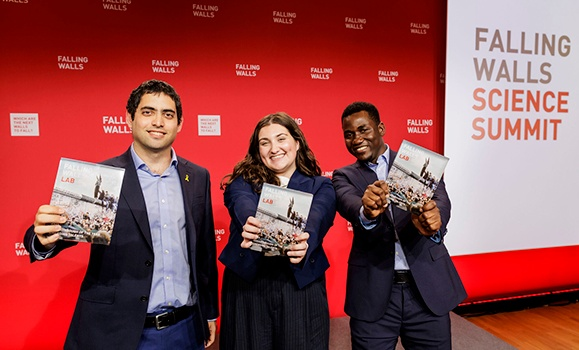
Dina Rogers, centre, took first place in the Science Breakthrough of the Year in the Emerging Talents category at Falling Walls in Berlin last week. (Falling Walls Foundation photo)
Dalhousie graduate student Dina Rogers is no stranger to sharing her groundbreaking research. She won the people's choice award at the 2024 3MT competition at Dalhousie and now has taken an even bigger prize in the 2024 Falling Walls Lab pitch competition: first place in the Science Breakthrough of the Year in the Emerging Talents category.
Dina, an MSc student in Biochemistry and Molecular Biology and Killam Predoctoral Scholar, won top spot in the competition last week for her pitch on using biology to dispose of plastic waste.
Her research shines a light on a novel approach to the engineering of hydrophobins for enhanced plastic degradation. She uses a metaphor about the classic arcade game Pac-Man to explain the process. But unlike the Pac-Man who munches his way across screens devouring ghosts, fruits and power pellets, Dina's Pac-Men are cuing up an even bigger meal of plastics, creating a biological way to recycle plastic.
This is the second time in two years a Dalhousie graduate student has taken the top prize in the Falling Walls Lab Pitches competition in Berlin, Germany. Last year, Joseph Bedard's presentation on constructing plastic out of nitrogen, one of the building blocks of air, along with a little phosphorus took the top prize.
On her way to Berlin, Dina beat out 13 other contenders at the Falling Walls Atlantic Canada competition, an experience she called "surreal."
We caught up with Dina shortly after her win to discuss her success and what this means for her research moving forward.
Your research focuses on creating bioengineered fungal proteins Pacmen with superpowers, as you describe it. Why is this important?
Our world population is growing, and with it has come drastic increases in the use of consumer-based plastics. This has devastating impacts on our environments. By 2050, we will have more plastic than fish in our oceans. There needs to be a sustainable solution to the alarming increase of plastic accumulation in our environments. Climate change and plastic pollution are huge issues that affect everyone no matter your demographic or place you live; the devastating effects are widespread. Finding an economic, efficient and environmentally friendly solution to this huge issue is vital. This project starts to address this in a unique way without harmful chemicals or materials. It isn't by any means full proof yet, but my fingers are crossed for the future.
What is unique about your research's approach to devouring plastic waste?
Scientists in the field have majorly focused on directly altering the plastic degrading protein (PETase) structure to make it more efficient. Our lab has a different approach which includes engineering the PETase protein to these fungal proteins called hydrophobins to make it more efficient. Hydrophobins naturally form coatings at interfaces, so they have the ability to stick to plastic. When fused to PETase, the hydrophobins stick to the plastic and force the PETase to the surface rather than allowing it to fall off. By creating this fusion protein we have a new approach that improves efficiency of plastic degradation. The use of the hydrophobin and creation of a fusion protein makes this approach unique for the biological recycling of plastics.
Why do you think your pitch was so successful at Falling Walls?
The support network I had was truly incredible: being given an international stage to share your research is an exciting opportunity that comes with a lot of nerves. There was so much support from my supervisor Dr. David Langelaan, sales pitch coach Permjot Valia, everyone at the office of the VPRI, as well as my friends and family. While in Berlin, Dr. Alice Aiken (Dal's vice president research and innovation) and Dr. Geneviève Tanguay (vice-conseillère scientifique en chef du Canada) were my biggest cheerleaders and supporters. Having them attend was an invaluable support. This is not only my win, it's one that belongs to everyone who supported me along the way.
For the pitch, I think what sold it was the innovative potential for widespread impact.
Aside from that, I love presenting, especially about science, so I have a sort of authentic giddy energy. I think the light-heartedness, simple language and dramatic ending ultimately won everyone over. I was able to pitch my research in a way that was authentic to me without watering down the scientific impact. Permjot and I also worked diligently to ensure that the pitch was internationally relevant. This way everyone in the audience could imagine the impact on their own country.
What does winning the Falling Walls competition mean to you and your research going forward?
On a personal level, it is surreal. I am the first scientist in my family, so it's an overwhelming honour to be selected as the winner out of the 100 talented scientists who pitched. The spirit of collaboration, support for one another, and excitement from all of the competitors was something I will hold close to me forever. I cannot wait to see where everyone ends up and feel proud to call many of these scientists my friends. I am cheering them on in their endeavors and feel fortunate to have found a community of like-minded researchers in different disciplines and countries across the world. Seeing them pitch was the highlight of the experience and unspeakably inspiring.
In terms of research, exposure on an international stage is something most researchers dream of. Making connections in science is crucial. I feel fortunate to now have relations with some extremely influential and important scientists, government representatives, policy makers and many other individuals.













